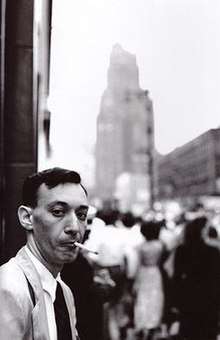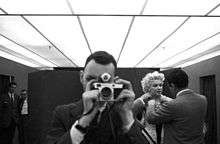Ed Feingersh
Ed Feingersh (1925–1961) studied photography under Alexey Brodovitch at the New School of Social Research. He later worked as a photojournalist for the Pix Publishing agency. His talent for available light photography under seemingly impossible conditions was well recognised.[1][2] His pictures of Marilyn Monroe are his best known, but he was a prolific photojournalist throughout the 1950s. Two of his moody photographs of jazz performers were selected by Edward Steichen for MoMA’s world-touring The Family of Man exhibition.
Ed Feingersh | |
|---|---|
 Ed Feingersh photographed by ©Julia Scully in NYC, 1952 | |
| Born | Edwin Feingersh April 21, 1925 |
| Died | June 21, aged 36 New York City, United States of America |
| Other names | Edward, Eddie |
| Education | New School of Social Research |
| Occupation | Photojournalist |
| Agent | PIX Publishing |
| Spouse(s) | Miriam Sakol (b.1933), m.1957, annulled 1957 |
Career

Edwin (a.k.a. Edward, commonly 'Ed' or 'Eddie') Feingersh was born in Brooklyn on 21 April 1925, the second of three sons of Harry Feingersh, a women's fashion designer and Rae Feingersh (née Press). His Jewish grandfather Abraham, a tailor, migrated to America from Moldavia in 1913 to escape the pogroms.[3] Ed Feingersh majored in art at Manhattan's Haaren High School.
He took up photography during while serving in Germany in the Army, where he bought an inexpensive 35-mm camera. After the war, with the assistance of the G.I. Bill, he first attended New York University, where he joined the camera club, and later enrolled in Alexey Brodovitch's photography course at the New School for Social Research.[4] He worked during this period as assistant to Gjon Mili.[5] This experience, and photographs he took for the course secured work as a 22-year-old stringer with Pix Publishing photo agency in 1948. For them he produced stories for major magazines including a day in the life of a woman doctor for McCall's, moody and revealing scenes from a Tokyo night club for Argosy men's magazine, a report on German war orphans for Redbook, a study of a disturbed boy's psychological rehabilitation and the story "The Great Rock 'n' Roll Controversy', both for Look,[6] in addition to making a portrait series of Albert Schweitzer in New York and covering a night fighter squadron's mission over Greenland.[7]
His coverage of the Korean War, particularly the Battle of Pork Chop Hill (1953), involved Feingersh carrying in addition to his cameras, the gun, pack, and other standard G.I. equipment, nevertheless, he produced imagery with his wide-angle lens that conveyed a charged, first-person perspective.[8] The work was published in Pageant and Argosy. He developed a reputation for putting himself at risk to get the eye-catching shot the magazine editors craved; parachuting with paratroopers, lying right in the path of stunt cars[9] and having himself tied to the periscope to photograph a submarine diving.[10]
At PIX he worked alongside the agency photographers Alfred Eisenstaedt, George Karger, Jerry Cooke, Eileen Darby (Lester), Robert and Cornell Capa, George Zimbel, Bob Schwalberg, Lawrence Fried, Bob Henriquez, and Garry Winogrand whom Feingersh introduced to the photo agency.[11]
Marilyn Monroe

Ed Feingersh photographed Marilyn Monroe for Redbook magazine in March 1955 for a story which would follow Monroe through her daily routine, the photography to be candid and shot without flash in available light.[12] The actress and her new production-company partner Milton Greene recommended him to the magazine as their choice.
The photographs he made of her during the week March 24–30, 1955 as she prepares for two appearances; opening night of Cat on a Hot Tin Roof at the Morosco Theatre, and being fitted with a burlesque corset for her ride on a pink elephant at a charity event at Madison Square Garden,[13] were the only candid images of the actress made specifically for publication.[14] An example is a wide angle shot of the corseted Monroe reflected in a mirror contains an out-of-focus self-portrait of the photographer holding a Nikon S2 fitted with 35mm lens, the rangefinder camera he customarily used and which was starting then to be adopted by picture magazines in America previously wary of Japanese equipment.[15]
Redbook asked him to repeat the exercise in 1957, and he accepted their assignment to photograph Audrey Hepburn and Mel Ferrier in Paris, again candidly, capturing their actions in dance rehearsals under difficult low-light conditions requiring shutter speeds of 1/15 sec. and lower.[16]
In 2013 Chanel ran an advertising campaign using a recorded interview with Monroe in which she is asked about her use of Chanel No.5 fragrance. It featured Feingersh's photograph of the actress splashing herself with a bottle of the perfume.[17]
Late career and legacy
Robert Stein, then editor of Redbook magazine and later, president of the American Society of Magazine Editors, was a close friend of the photographer. He reports (in 2005) that Feingersh suffered depression between his bouts of frenetic activity, and in the years immediately after the Monroe shoot, and after a brief, failed marriage (1957) to Miriam (Mimi) Sakol (b.1933), he gave up photography.
Stein subsequently invited him to join him at Redbook as picture editor, but Feingersh soon succumbed to alcoholism, poor mental and physical health, neglected his work and died 'in his sleep' on the morning of June 21, 1961 at the home of friends in New York.[18] He was buried in the family plot at Prospect Park in Brooklyn.
Full of praise for his colleague's photography, Stein says that though many want to see 'Eddie's' work in public collections of 'museums to give him the recognition he deserves'.[19] His collection is now in the archives of Life Magazine and Getty Images and in the process of being edited and scanned, many of which can be found on gettyimages.com.
In 1987, 26 years after Ed Feingersh died, photography collector Michael Ochs uncovered a cache of several rolls of negatives and proofs that revealed the unpublished images from the Monroe series.[20] This collection is held by Getty Images and consequently they are the most seen of Feingersh's photojournalistic output, accessed via countless Monroe fansites.
Books
- Feingersh, Ed; LaBrasca, Bob; Michael Ochs Archives (1990), Marilyn : March 1955, Delta, ISBN 978-0-385-30119-0
- Gombeaud, Adrien (2011), Une blonde à Manhattan : Ed Feingersh et Marilyn Monroe, Serpent à plumes ; Monaco : Rocher, ISBN 978-2-268-07129-9
Selected articles illustrated by Ed Feingersh
- Argosy’s Tips from Photographers, (cl) Argosy Jul 1952
- Argosy’s Tips from Photographers: Mistakes That Make Pictures, (cl) Argosy Jul 1953
- Dave Chambers’ $2,000,000 Worth of Horses, (pi) Argosy Mar 1955
- The Hot-Seat Drag, (pi) Argosy Jul 1954
- How Red China Gets Dope to Our GIs, (pi) Argosy Feb 1954
- Irish Horan’s Hell Drivers, (pi) Argosy Jun 1953
- The Last Patrol, (pi) Argosy Dec 1953
- Mistakes That Make Pictures, (cl) Argosy Jul 1953
- Nice Work If You Can Get It, (pi) Argosy May 1954
- Pictures Tell the Story: The Hot-Seat Drag, (pi) Argosy Jul 1954
- Pictures Tell the Story: The Last Patrol, (pi) Argosy Dec 1953
- What will happen to this boy?, produced by George B. Leonard, Jr., Look, v. 19, no. 21 (Oct. 18, 1955), p. 137-144. 15 images.
- The Private Takes a Wife, (pi) Redbook Dec 1955
- Vice Squad, (pi) Adventure Dec 1954
- The great rock 'n' roll controversy, Look, v. 20, no. 13 (June 26, 1956), p. 40-41, 42, 45, 47. 12 images
- Mike Wallace, Look, Mar. 21, 1957
- You Can’t Miss! (with Robert Bridgeport), (ar) Argosy Mar 1959
Bibliography
- Russel, J. (1989). Marilyn Monroe and the camera. Bulfinch P. Books.
- Greer, H. (2001). Immortalizing the ephemeral. The World & I, 16(6), 84.
- Zoom (NL) 1990, I/1, p. 38-45 (NFM)
- Van Ham Kunstauktionen: Photographie 254. Auktion, 11. Mai 2007 (2007) (NFM)
References
- Desfor, I. (1956, Nov 13). Light and photography. The Christian Science Monitor
- Popular Photography, November 1951 Vol. 29, No. 5
- Gombeaud, Adrien (2011), Une blonde à Manhattan : Ed Feingersh et Marilyn Monroe, Serpent à plumes ; Monaco : Rocher, ISBN 978-2-268-07129-9
- For Ed Feingersh and his connection to Brodovitch see U.S.Camera 1950.ed. Tom Maloney (New York: U. S. Camera, 1949), 239.
- Kahn, Marion Jacobs (2008) Child of Madness. Itasca Books p.142.
- Durniak, John (1957) 'Ed Feingersh: A Memorial Portfolio'. In Photography (USA) Annual 1957 pps.13, 148-157, 247-248
- Photography (USA) Annual 1962 pps. 14-18, 213.
- "One of the most famous of Ed Feingersh's "daredevil" pictures is...of Irish Horan's Hell Drivers. To take the photograph Feingersh had to crouch at the end of the ramp inches away from the cars which hurtled at a speed of 70 mph past him. The picture was taken on assignment for Argosy. CAMERA: Robot rapid-sequence with 40- mm Xenar f/ 1.9 lens. EXPOSURE: 1/500 second at f/8. page 16 Technical data unavailable." Durniak, John (1957) 'Ed Feingersh: A Memorial Portfolio'. In Photography (USA) Annual 1957 pps.13, 148-157, 247-248
- Scully, Julia (1979) Seeing Pictures. In MODERN PHOTOGRAPHY July 1979, U.S.A. pps.29, 150, 152.
- "Winogrand eventually got a job as a stringer for the Pix agency. He gained access to a darkroom and an office where he could talk with other photographers. One of the other photographers, Ed Feingersh introduced Winogrand to the agent Henrietta Brackman, probably because he was tired of Winogrand “borrowing” materials all the time. She got Winogrand commissions shooting various general interest stories for Colliers and Argosy."
- "Ed Feingersh, a pioneer in available-light photojournalism..." Popular Photography, Volume 72, 1973, p.83 CBS Magazines
- Miller, Jennifer Jean (2014) Marilyn Monroe & Joe DiMaggio - Love In Japan, Korea & Beyond, J.J. Avenue Productions U.S.A.
- Rollyson, Carl E. (Carl Edmund) (2014), Marilyn Monroe day by day : a timeline of people, places, and events, Lanham Rowman & Littlefield, ISBN 978-1-4422-3080-4
- "The "New York Times" issue on December 10, 1950 carried the following article by Jacob Deschin titled "JAPANESE CAMERA" which said that Nikon and Nikkor were scrutinized by experts and approved for their excellence.
- ’Ed Feingersh Shoots a Star in Motion’, Popular Photography April 1957 Vol. 40, No. 4. p.76-79
- "On her first cover of Life magazine in 1957, Marilyn Monroe famously said she only wore Chanel No.5 to bed. Now, a newly found recording of her from 1960 discussing the subject further with Marie Claire's then-editor in chief Georges Belmont is being used in a new advertising campaign for the fragrance set to break this fall. She said people pose questions. "They ask me: 'What do you wear to bed? A pajama top? The bottoms of the pajamas? A nightgown?' So I said, 'Chanel No.5,' because it's the truth....," she explained. "And yet, I don't want to say nude. But it's the truth!" The voice of Monroe who passed away in 1962 is to be accompanied by a photograph of her holding a scent bottle, taken by Ed Feingersh . The ad will run in publications and on television." Karimzadeh, Marc. "Memo Pad." WWD 18 Oct. 2013: 11. Popular Magazines Plus. Web. 17 Feb. 2016.
- Durniak, John (1957) 'Ed Feingersh: A Memorial Portfolio'. In Photography (USA) Annual 1957 pps.13, 148-157, 247-248
- Stein, Robert (2005) "Do You Want to See Her?". In American Heritage; Nov/Dec 2005, Vol. 56 Issue 6, p50
- Bird, Nichola Cecelia. "GETTING IN ON THE ACT." (1998) is a Leeds University PhD submission available at "Archived copy" (PDF). Archived from the original (PDF) on 2015-12-22. Retrieved 2015-12-21.CS1 maint: archived copy as title (link) which analyses these photographs.